
It allows to keep PV going, with more focus towards AI, but keeping be one of the few truly independent places.
-
Let's just hope the Daala project succeeds in providing a viable, non patent-encumbered alternative.
(See also:
http://www.tomshardware.com/news/ietf-standardizes-netvc-daala-codec,28821.html https://people.xiph.org/~xiphmont/demo/index.html )
-
On a brighter note, Windows 10 supports H265 natively. Clips from the Samsung NX1 and NX500 show up as thumbnails, just like (outdated) h264 clips. And the native media player plays the H265 clips with no trouble, the smoothness depending on the hardware.
-
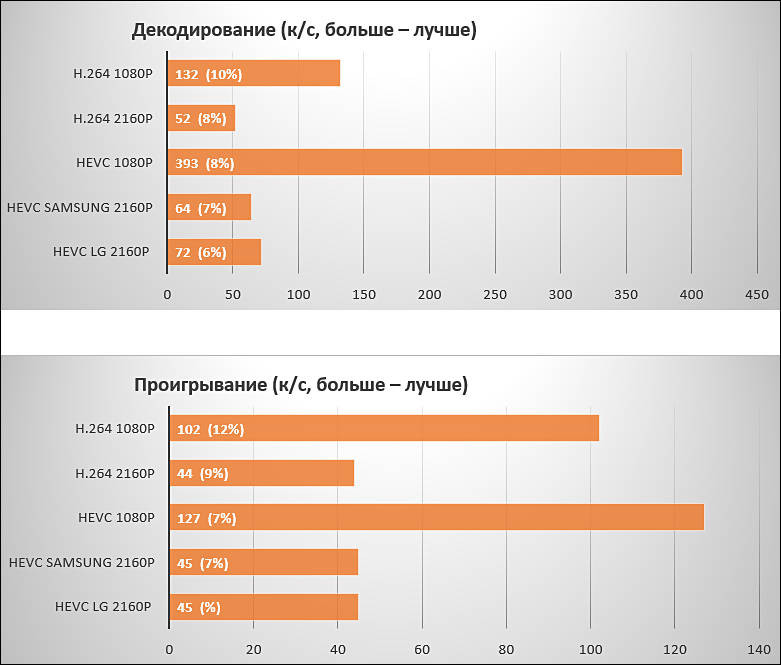
Atom x5 and x7 based tablets and boxes will play HEVC pretty good, including high bitrate from NX1.

 mitakon16.jpg781 x 665 - 60K
mitakon16.jpg781 x 665 - 60K -
Small Atom x5 stick
-
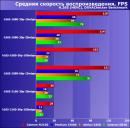
 zebra306.jpg601 x 593 - 60K
zebra306.jpg601 x 593 - 60K -
Hi guys, one question as I´m trying to save some space on my hd converting movies to H265, is there any way or any software as for today that is capable of gpu H265 encoding, on old graphics like GTX5xx or 6xxx, as far as I found out there is only NVENC HEVC running in CTX9xxx. On hybrid or mediacoder, saw other payed options too.
I assume it is possible to use the compute power on old GPUs to do this but it looks like there is only development to the internal video chip of the cards. And old Chips are not compatible with HEVC H265.
Some ideas?
Getting from 3 to 15 fps and cpu only as for today.
Thanks
-
You won't save much on H.265 compared to good software based x264 for now, like 10-20% may be.
Almost all GPU encoders are made for speed, not quality.
-
Thanks, yes I noticed that also, but time is very consuming as for my system, so ended up using Hybrid with NVENC X264, at about 80fps at decent quality, huge difference.
Hope they get this codec ready to use soon it´s very promising. ;-)
-
You mean just H.264?
-
I think he means the NVIDIA NVENC H.264 Encoder, right?
-
YES jajaja can't edit previous post.
Is H264, there is like Vitaliy said a 20% aprox. smaller size in H265 but in my system it renders on Hydrid at about 15fps in decent quality, in NVIDIA NVENC H.264speeds up to 80fps, its a huge difference maybe for people with GTX9xxx graphics it's ok to go H265 for now for the rest of us not really. Too much time, small benefit.
You can get decent quality from full HD complete movie in about 1.7 / 1.8 Gb aprox. in H264. In H265 you can go for 1.1 /1.2 Gb Exact same quality and maybe is my settings but I prefer the texture detail more in H264, in H265 there is some strange smooth going on, need to tweak more on Hybrid settings that by any means are simple jajajajaja
Thanks all
-
AMD APUs Bristol Ridge and Stoney Ridge come with HEVC support
-
Rockchip that supports H265 hardware playback
-
outside China HEVC is not popular at all due to the royalty issues. But in China we start seeing that HEVC standard being well widely adopted and a lot of people are using them in for Chinese internal consumption. So I think that HEVC definitely is China market only.
So HEVC legal shit continues.
-
Good article, slightly naïve
To accelerate HEVC adoption, I propose that HEVC patent licensors agree to the following principles;
- All HEVC patent holders should make their patents available through a patent pool
- Ideally, all patent holders should join one patent pool
- Only one reasonable royalty should be paid per device
- Software decoding on consumer devices must be royalty free
- Software encoding on consumer devices must be royalty free
- Content distribution must be royalty free
- There must be a reasonable cap on total royalties owed for HEVC implementations
-
About the AV1 Codec
As mentioned, AV1 is expected to ship as early as December 2016, and no later than March 2017. The initial AV1 implementation will incorporate some features of Daala and Thor, but most of the code will come from VP10, which was scheduled to ship by the end of 2016.
The Alliance is targeting an improvement of 50 percent over VP9/HEVC with reasonable increases in encoding and playback complexity. One focus is UHD video, including higher bitrate, wider color gamut, and increased frame rates, with the group targeting the ability to play 4K 60fps in a browser on a reasonably fast computer. The base version of the codec will support 10-bit and 12-bit encoding, as well as the BT.2020 color space. Another focus is providing a codec for WebRTC (Real-Time Communications), an initiative supported by Alliance members Google and Mozilla, and similar applications including Microsoft's Skype.
http://www.streamingmedia.com/Articles/Editorial/What-Is-.../What-is-AV1-111497.aspx
-
As usual, they will fight over the peanuts until the elephant starves.
-
A Large-Scale Comparison of x264, x265, and libvpx
Start at 1 hour mark
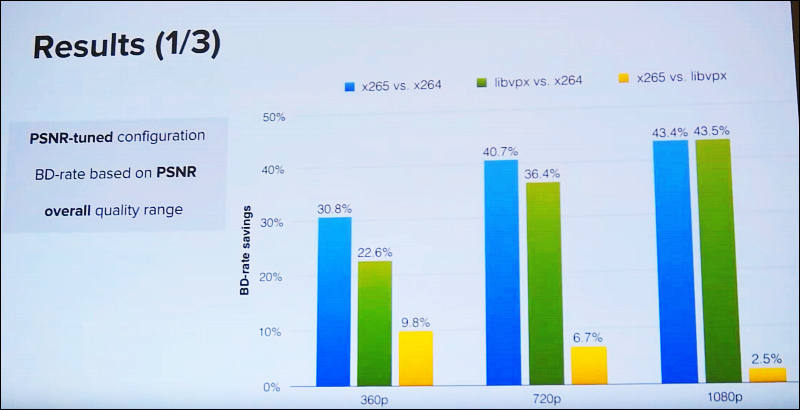
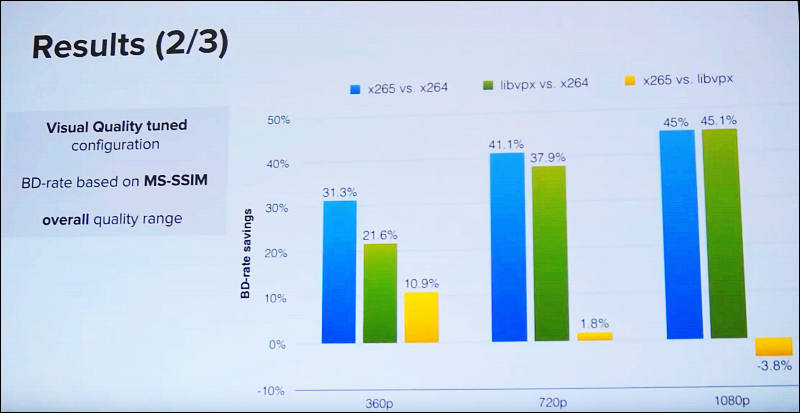
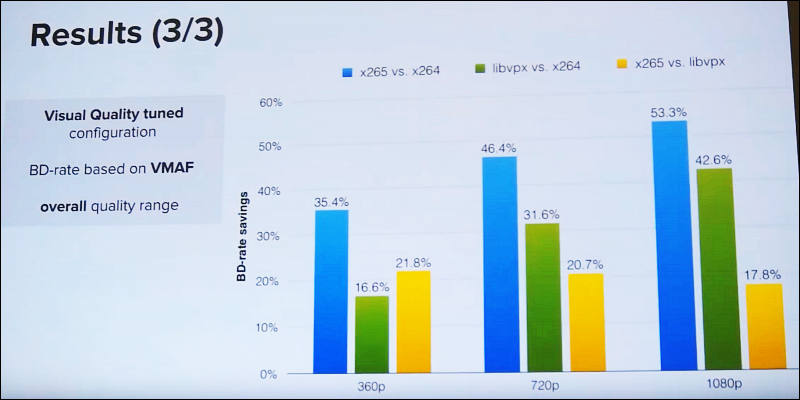

 img2547.jpg800 x 410 - 40K
img2547.jpg800 x 410 - 40K
 img2548.jpg800 x 413 - 39K
img2548.jpg800 x 413 - 39K
 img2549.jpg800 x 400 - 38K
img2549.jpg800 x 400 - 38K -
Another good fresh comparison from MSU
Fast encoding for Intel QuickSync is better than x264 levels
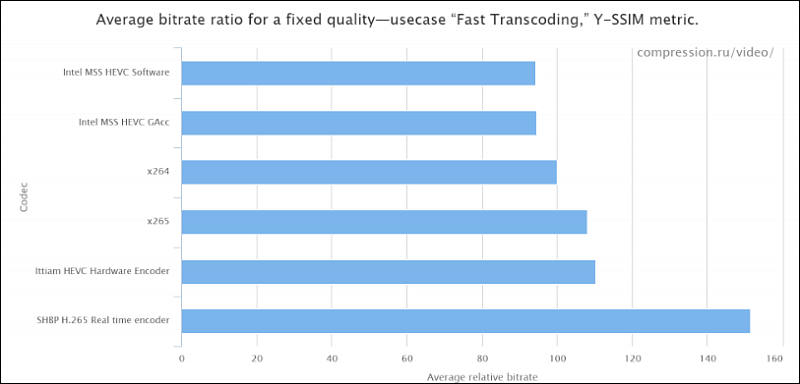
And same for slower encode
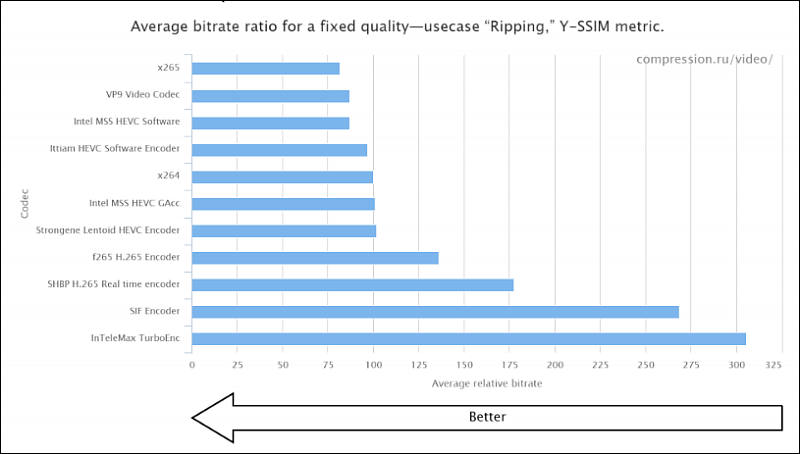

 img2546.jpg800 x 384 - 34K
img2546.jpg800 x 384 - 34K
 img2545.jpg800 x 454 - 43K
img2545.jpg800 x 454 - 43K -
Speed aside, the above presented results look inconsistent:
The slides in your posting from 6:26AM claim that a x265 encoding can save 45% bitrate at the same SSIM score for 1080p video over a x264 encoding.
The second chart in your posting from 6:40AM only shows only a 20% saving of bitrate for a fixed SSIM score for x265 over x264.
In my personal experience, the latter (20% saving for h.265 vs. h.264) is the much more realistic figure to expect.
-
They are consistent, you just ignore that video set differ completely and also settings differ.
MSU never use slowest encoding. And Netflix results are for most extreme case, as they later stream it to millions of people, so even if they can save 1% it is big.
-
After long pause DJI Inspire 2 joined Samsung NX cameras as having HEVC encoding
http://www.personal-view.com/talks/discussion/16051/dji-inspire-2-with-3-eyes-and-hevc-now
-
I have a Dell Desktop that's a few years old. CPU is i73770 3.4ghz, 12gig of ram, AMD Radeon 7700 graphics. Windows 8.1. Is that enough to edit natively with either the latests version of Vegas or Premiere? Shooting with NX500. Smooth playback in the timeline being a primary consideration.
-
MSU 2017 encoders comparison
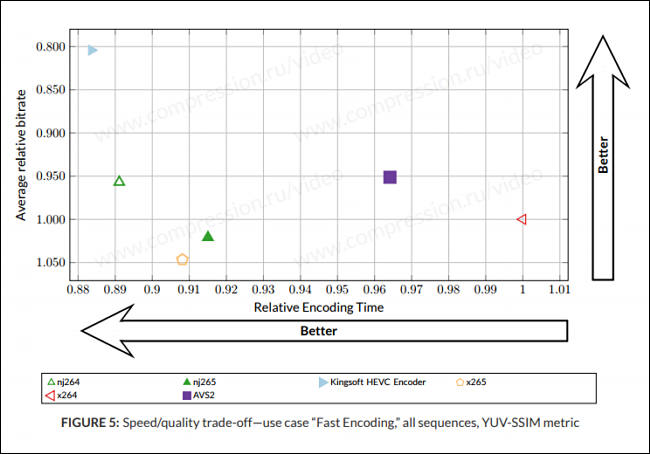
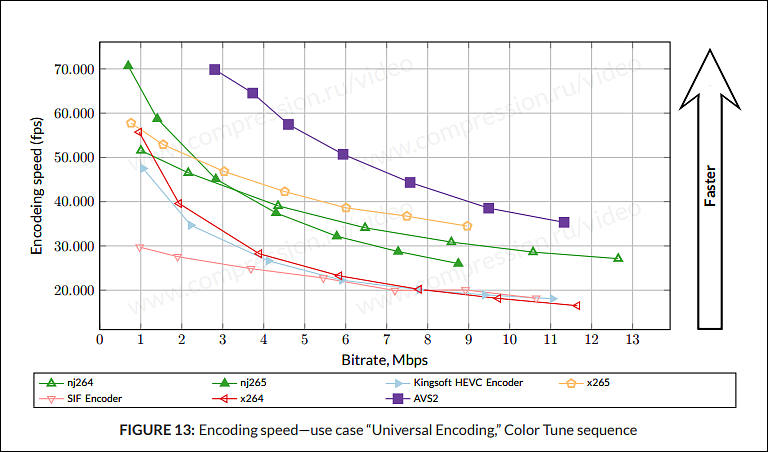
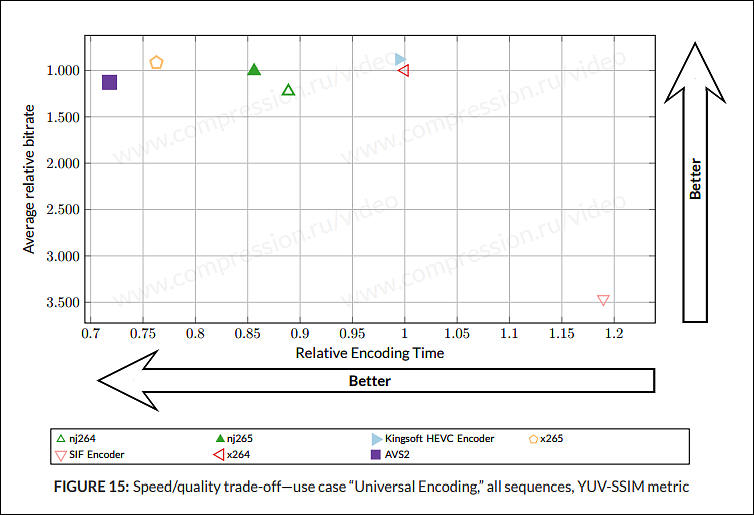
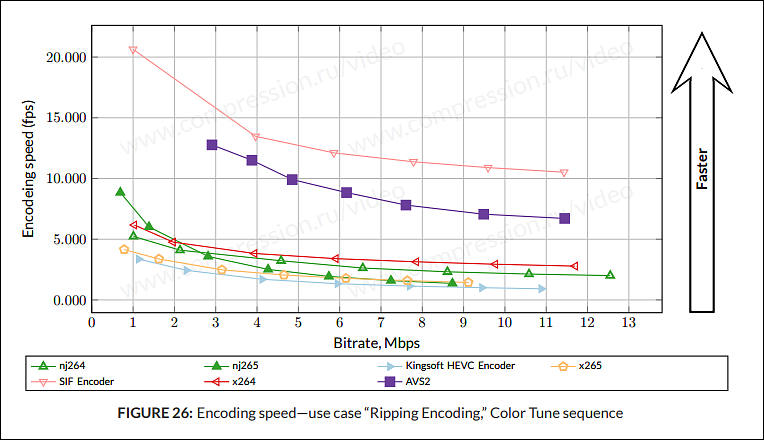
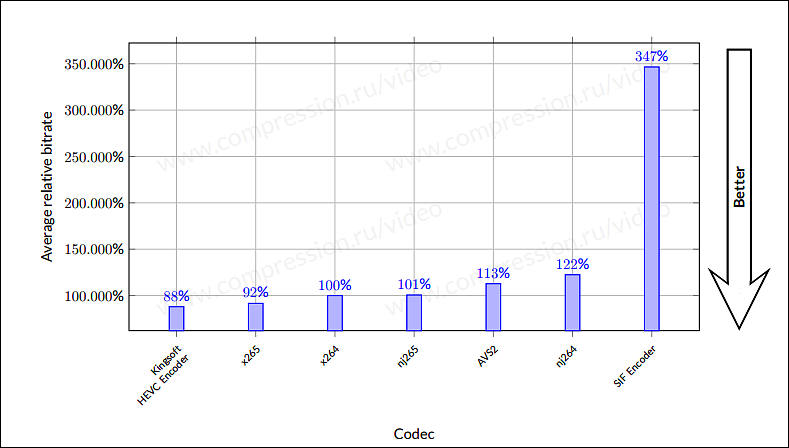
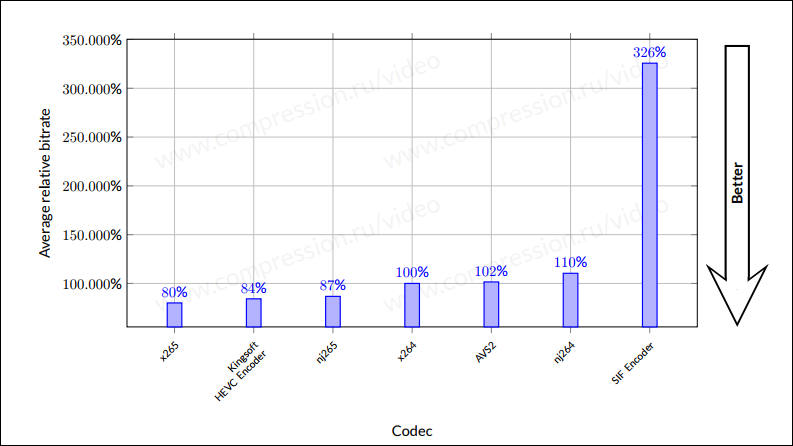
To be short - they push Kingsoft encoder, but it is good for fast encoding only.
If you want to produce final product (Ripping part) you should use x265.
http://compression.ru/video/codec_comparison/hevc_2017/MSU_HEVC_comparison_2017_free.pdf

 sa133.jpg650 x 454 - 45K
sa133.jpg650 x 454 - 45K
 sa134.jpg768 x 452 - 66K
sa134.jpg768 x 452 - 66K
 sa135.jpg754 x 515 - 63K
sa135.jpg754 x 515 - 63K
 sa137.jpg764 x 440 - 62K
sa137.jpg764 x 440 - 62K
 sa138.jpg789 x 448 - 48K
sa138.jpg789 x 448 - 48K
 sa140.jpg793 x 446 - 43K
sa140.jpg793 x 446 - 43K
Howdy, Stranger!
It looks like you're new here. If you want to get involved, click one of these buttons!
Categories
- Topics List23,964
- Blog5,723
- General and News1,342
- Hacks and Patches1,151
- ↳ Top Settings33
- ↳ Beginners254
- ↳ Archives402
- ↳ Hacks News and Development56
- Cameras2,361
- ↳ Panasonic990
- ↳ Canon118
- ↳ Sony154
- ↳ Nikon96
- ↳ Pentax and Samsung70
- ↳ Olympus and Fujifilm99
- ↳ Compacts and Camcorders299
- ↳ Smartphones for video97
- ↳ Pro Video Cameras191
- ↳ BlackMagic and other raw cameras121
- Skill1,961
- ↳ Business and distribution66
- ↳ Preparation, scripts and legal38
- ↳ Art149
- ↳ Import, Convert, Exporting291
- ↳ Editors191
- ↳ Effects and stunts115
- ↳ Color grading197
- ↳ Sound and Music280
- ↳ Lighting96
- ↳ Software and storage tips267
- Gear5,414
- ↳ Filters, Adapters, Matte boxes344
- ↳ Lenses1,579
- ↳ Follow focus and gears93
- ↳ Sound498
- ↳ Lighting gear314
- ↳ Camera movement230
- ↳ Gimbals and copters302
- ↳ Rigs and related stuff272
- ↳ Power solutions83
- ↳ Monitors and viewfinders339
- ↳ Tripods and fluid heads139
- ↳ Storage286
- ↳ Computers and studio gear560
- ↳ VR and 3D248
- Showcase1,859
- Marketplace2,834
- Offtopic1,319









